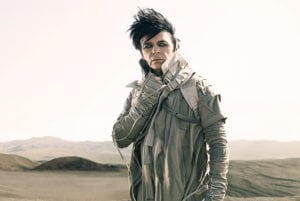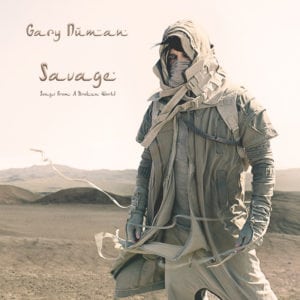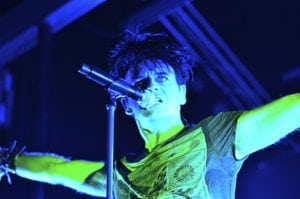Always moving forward, Gary Numan continues to be a pioneer. While first becoming a household name with his futuristic single “Cars” in the early eighties, he has never stood still. Always looking ahead at what’s next, he has constantly molded and transformed his sound: from the synthesizer played through guitar effects in his early work, to experiments with jazz as well as funk, to the industrial style of his more recent output.
As a result of all this, he released his 18th album Savage (Songs from a Broken World) last year and is currently touring around the world behind it. Garnering rave reviews, it further establishes Numan’s desire to keep pushing forward and push the envelope of what music can be. In anticipation of his Sep. 4 show at The Observatory, we caught up with Numan to find out what makes him tick, the concept behind Savage, and what tomorrow holds.
CONCERT GUIDE LIVE: You’re currently on tour. For those who do or don’t know your history, what can we expect from a Gary Numan concert these days?
GARY NUMAN: I have a real problem with nostalgia, I don’t like it at all, so I tend to focus on the new rather than the old. For people coming along hoping to predominantly listen to the early electronic stuff from a lifetime ago, I think they will be disappointed. Most fans are aware of this though. I’ve never wallowed in nostalgia. I do a few songs from the early days but it’s a quarter of the set at best. I’m promoting a new album, Savage; in fact, this is my second North American tour promoting Savage, so that’s where the main thrust of the show comes from.
CGL: Tell me a little bit about your last album Savage (Songs from a Broken World). Why did you choose that name for it?
GN: Savage looks at a world in the future that’s been devastated by global warming. However, the global warming element of it is simply the backdrop for the main topic the album looks at, which is the brutality of humankind when survival of the fittest becomes the norm. It is not a happy album, but it does have tiny slivers of hope if you look hard.
CGL: Is there a particular song that sticks out for you from that album?
GN: I like to think it has many stand out songs but the one that really works the best for me is a song called “My Name Is Ruin.” Partly because my daughter Persia sings on it, and appears in the video for it to be honest. She’s also toured with me a number of times, and has sung it live all over the world so it’s become a definite favorite to play live.
CGL: What are some of your favorite songs to play from Savage?
GN: The album was written from the outset to work well when played live. The majority of the songs therefore have huge chorus melodies and are deliberately dynamic sonically. This makes them exciting to play live, but my favorites are “My Name Is Ruin” and “Ghost Nation.”
CGL: Who is in the current tour lineup? Have you guys toured and played together before?
GN: Richard Beasley on drums, Tim Muddiman on bass, Steve Harris on guitar and David Brooks on keyboards. Tim is the new boy, and yet, he’s been with me for nearly 20 years. We are all very close friends and have been touring together for a very long time, so it makes it a very enjoyable experience. Arguments amongst us are almost unheard of, extremely rare. I could never tour with people that I didn’t get on with. Spending months at a time in a bus with the same people could be difficult if the personality mix isn’t right. We have that, with the crew as well actually. I miss everyone when we’re not touring.
CGL: What is your favorite aspect to playing a live show?
GN: The crowd reaction makes or breaks it. If the crowd is with you, and vocal about it, that lifts you to a state that’s hard to find anywhere else. It is literally ‘uplifting,’ and we all feed on that. A quiet crowd makes it feel more like a job. Luckily, we don’t get too many of that kind. Also though, I love traveling; so beyond the show itself, I really love the process of touring, of constantly moving to new places. Each day becomes a new adventure.
CGL: Which other songs from your history do you especially like to play?
GN: From my history? None really. I’ve played all the older songs a thousand times, so they’ve lost their spark and charm somewhat. Because of that, I do try to pull out some rare things once in a while to keep me interested in back catalogue, or rework them to keep them feeling a bit fresher. That works for a while.
CGL: You have been playing music for 20+ years now. What is your take on the current state of music and its future?
GN: I’ve actually been doing this for over 40 years and I very much do my own thing. I welcome new technologies, be it musical or social, and incorporate those that help and move around those that don’t. But, it’s all about how it can help me. I got sick to death of listening to people whining about the state of the music business, albums sales falling, this is wrong, that’s wrong, always complaining, always worrying. I don’t agree with any of that. These changes are not the death knell of the music business. I’ve loved the way the business has evolved over the last 15, 20 years or so. I’ve embraced every change that I thought would help me and my career. It’s brought artists closer to fans (for those that want that); yes, record sales have fallen but new opportunities have come along. New types of label deals have meant that, for some of us, decreased album sales have not necessarily meant a decrease in income. You just have to really understand what works and what doesn’t. I self-manage for example, that was a huge change, but it’s really worked for me. I don’t sign conventional artist deals with labels, haven’t for a long time. There is so much you can do to combat the down side of change if you keep your eyes open, and there are new opportunities that didn’t exist before.
CGL: What do you like about playing music today compared to the past?
GN: Nothing’s changed as far as I can tell. Playing music today is exciting and rewarding, just as it was before. The only thing I would suggest that is arguably better these days is reliability of equipment. It is true that I have more confidence now compared to when I started, which is understandable, and that brings with it a less stressed attitude at show time. I like that, so that’s an improvement I suppose.
CGL: Is there a new album and/or material in the works?
GN: There is a special edition of Savage with three new songs coming out in November, but I plan to start the next studio album, the follow up to Savage, in February 2019. Looking forward to that very much.
CGL: What inspires you to continue making new music?
GN: I have three children so wanting to make sure I can give them the best chance in life keeps me eager to work harder than ever. Beyond that, I’ve never lost my love for moving forward. I still get very excited by the challenge of finding new sounds, new ways of putting music together, new things to write about. I’m creative by nature, it’s a need as much as a desire, so I’m always surprised when people get in to the latter stages of their career and start writing bland old shit, or repeating themselves musically. Wanting to progress, to create new things, is what gets me up in the morning. It’s never been a problem finding the desire to do that.
CGL: Is there anything else you would like to add?
GN: Just that I am hugely grateful for the support. People taking the time to come to a gig is not something I take for granted, and I am very grateful.


